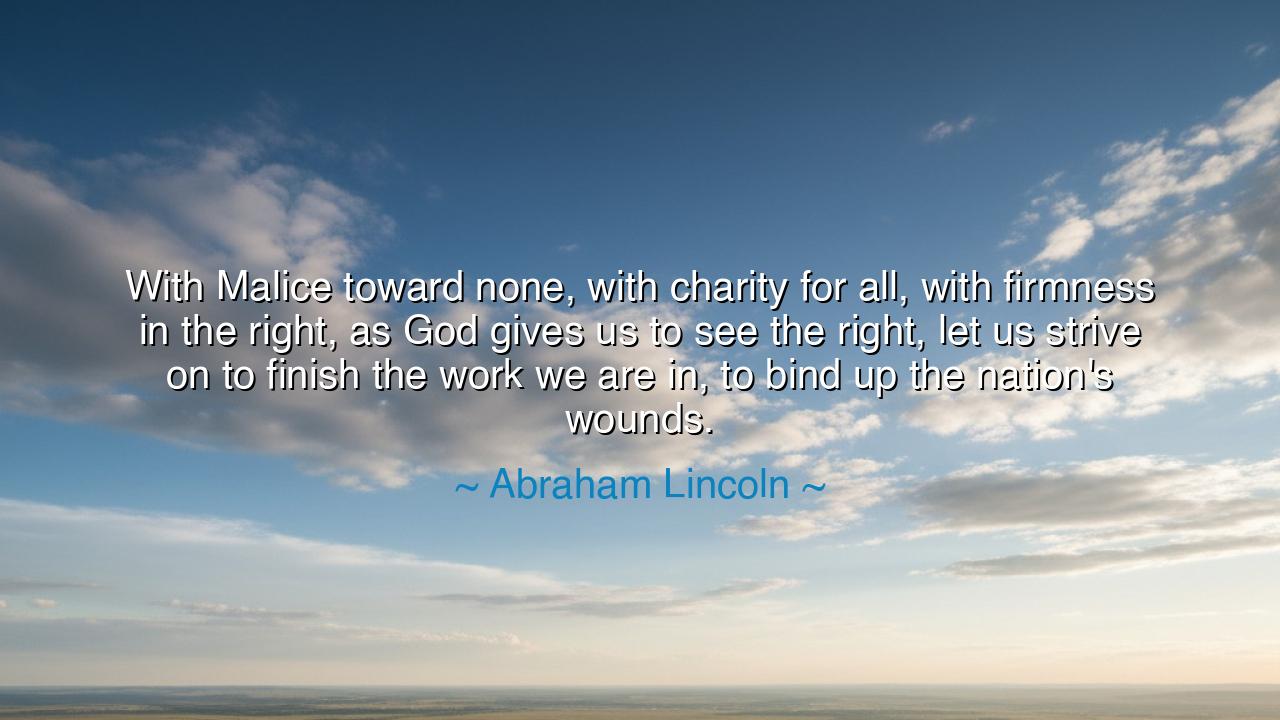
With Malice toward none, with charity for all, with firmness in
With Malice toward none, with charity for all, with firmness in the right, as God gives us to see the right, let us strive on to finish the work we are in, to bind up the nation's wounds.






“With malice toward none, with charity for all, with firmness in the right, as God gives us to see the right, let us strive on to finish the work we are in, to bind up the nation’s wounds.” — Abraham Lincoln
In the twilight of a nation torn by fire and sorrow, Abraham Lincoln rose before his people and spoke words that trembled with both mercy and resolve. It was the year 1865, and the Civil War—that great storm of brother against brother—was drawing to its close. Yet victory brought no triumph to Lincoln’s lips, only compassion. From the ashes of battle, he called not for vengeance, but for healing. His words, uttered in his Second Inaugural Address, were not merely the speech of a statesman—they were the prayer of a soul that saw beyond victory and defeat to the deeper work of restoration.
“With malice toward none, with charity for all”—here Lincoln reached into the highest chambers of the human spirit. To harbor malice, to nurse the poison of hatred, is to prolong the war within even when the guns have gone silent. But to show charity, to forgive the fallen and lift the broken, is to rebuild not just walls, but hearts. In these words, Lincoln invited his people to become more than conquerors—to be healers in the image of the divine. For what use is victory if the soul remains divided? What glory is there in triumph if the heart forgets mercy?
When he spoke of firmness in the right, Lincoln did not mean stubborn pride, but moral strength—the courage to hold fast to justice even when mercy softens the hand. He understood that righteousness without compassion becomes cruelty, and compassion without righteousness becomes weakness. So he sought the sacred balance, saying, “as God gives us to see the right”—for even the wisest must bow before the mystery of divine truth. In those words lived humility, the rarest virtue of power.
Think of the world Lincoln faced: the land split by blood, families shattered, the air still thick with grief. He could have demanded punishment, demanded tribute, demanded silence from those who rebelled. But instead, he spoke of binding wounds. Like an ancient healer standing amid ruins, he called his nation to the work of mending—to rebuild not through hatred, but through forgiveness and labor. This was not weakness, but greatness. For only those who master their anger can master the future.
In the ages that followed, his example lived on. After the Second World War, when Europe lay in rubble, leaders remembered this spirit. Instead of crushing their enemies, the nations of the world built the Marshall Plan, extending aid to the very lands that once raised their swords. This was Lincoln’s vision reborn—the belief that peace is not merely the absence of war, but the presence of goodwill. History has shown that such mercy creates strength, while vengeance breeds only the ghosts of war reborn.
This teaching, though born in a time of muskets and flags, is eternal. Each of us, in our smaller battles, must learn to live without malice and with charity. When wronged, seek not to wound in return, but to understand. When you hold power, use it to lift, not to crush. Be firm in the right, yes, but humble enough to see that others too may carry fragments of truth. For the power to heal is the highest form of strength, and the choice to forgive is the noblest act of courage.
And so, children of the future, remember the wisdom of the Great Emancipator. When you stand amid conflict—whether in nations, families, or your own heart—be as he was: steadfast in principle, gentle in spirit, unyielding in goodness. Do not let malice chain you, nor pride blind you. Strive always to bind the wounds of those around you, even when your own remain unhealed.
For it is through this sacred work—the work of mercy—that civilizations rise again from ashes. And when you live by this truth, the spirit of Lincoln walks beside you still: a quiet voice whispering through the centuries, “Finish the work you are in. Heal what has been broken. And do it all—with malice toward none, with charity for all.”






AAdministratorAdministrator
Welcome, honored guests. Please leave a comment, we will respond soon